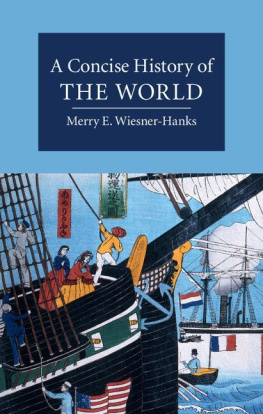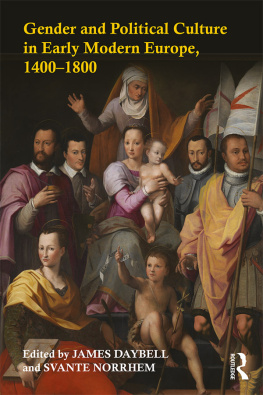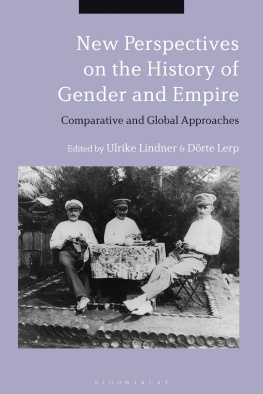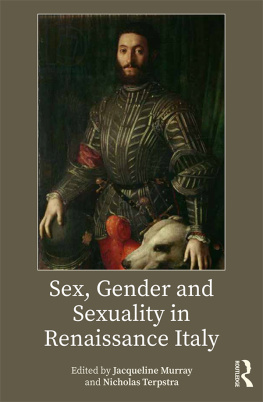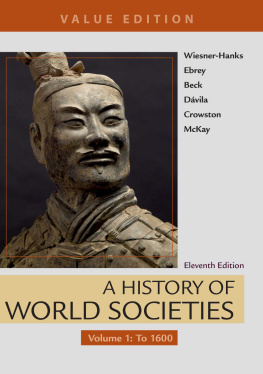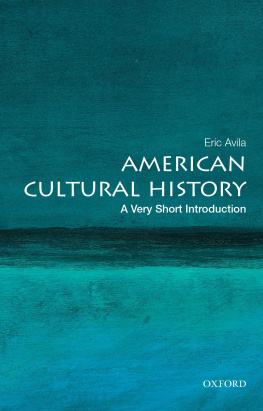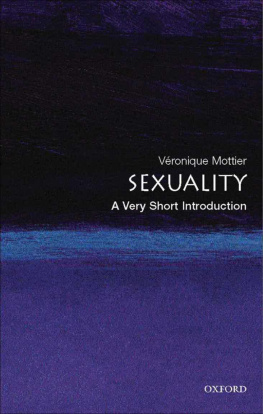Merry E. Wiesner-Hanks - Gender in history: global perspectives
Here you can read online Merry E. Wiesner-Hanks - Gender in history: global perspectives full text of the book (entire story) in english for free. Download pdf and epub, get meaning, cover and reviews about this ebook. City: Malden;Mass, year: 2011, publisher: Wiley-Blackwell, genre: Romance novel. Description of the work, (preface) as well as reviews are available. Best literature library LitArk.com created for fans of good reading and offers a wide selection of genres:
Romance novel
Science fiction
Adventure
Detective
Science
History
Home and family
Prose
Art
Politics
Computer
Non-fiction
Religion
Business
Children
Humor
Choose a favorite category and find really read worthwhile books. Enjoy immersion in the world of imagination, feel the emotions of the characters or learn something new for yourself, make an fascinating discovery.

- Book:Gender in history: global perspectives
- Author:
- Publisher:Wiley-Blackwell
- Genre:
- Year:2011
- City:Malden;Mass
- Rating:4 / 5
- Favourites:Add to favourites
- Your mark:
- 80
- 1
- 2
- 3
- 4
- 5
Gender in history: global perspectives: summary, description and annotation
We offer to read an annotation, description, summary or preface (depends on what the author of the book "Gender in history: global perspectives" wrote himself). If you haven't found the necessary information about the book — write in the comments, we will try to find it.
Gender in history: global perspectives — read online for free the complete book (whole text) full work
Below is the text of the book, divided by pages. System saving the place of the last page read, allows you to conveniently read the book "Gender in history: global perspectives" online for free, without having to search again every time where you left off. Put a bookmark, and you can go to the page where you finished reading at any time.
Font size:
Interval:
Bookmark:
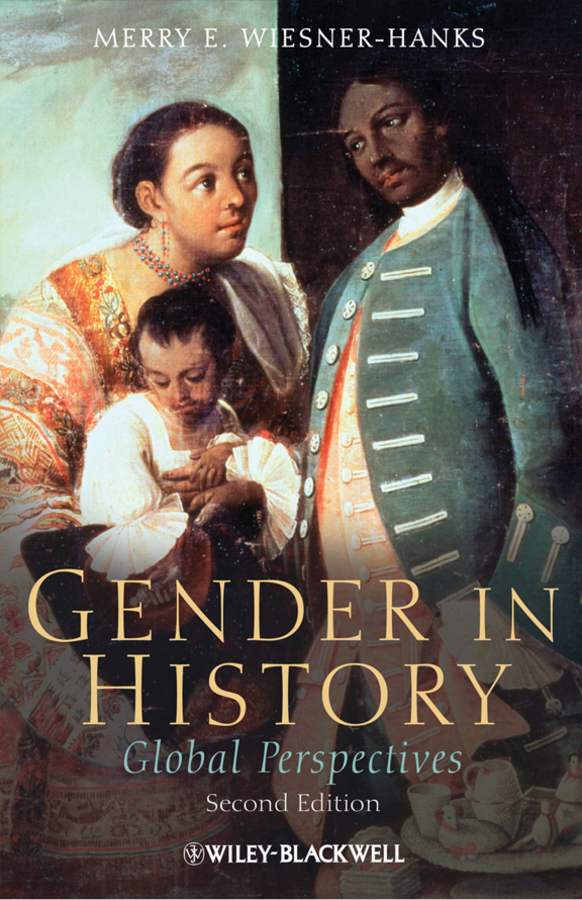
Praise for the first edition
Wiesner-Hanks... accomplishes a near-impossible feat a review of what is known about the construction of gender and the character of womens lives in all known cultures over the course of human history.... Theoretically sophisticated and doing justice to the historical and cross-cultural record, yet assimilable by students...
Choice
Professor Merry Wiesner-Hanks draws on this wealth of scholarship and her own research to provide a welcome overview of gender in global history from prehistory to date... I would recommend Gender in History as a set text for all students beginning a degree in history, alongside more conventional fare like E. H. Carrs What is History? It should not be restricted to those students who select a course in which the main topic of study is gender. For, crucially, it demonstrates that gender is as significant as social class, race and ethnicity as a category of historical analysis, as well as providing novice historians with many insights into understanding history. This is not to ignore that it is also of value to more experienced historians, particularly because of its thematically arranged suggestions for further reading.
Reviews in History
Merry Wiesner-Hanks has produced a judicious and learned book. Gender in History brilliantly explores the influence of gender constructs in political, social, economic, and cultural affairs. The remarkable cultural, geographical, and chronological range of Wiesner-Hanks research is matched only by the sophistication, nuance, and clarity of her analysis. This book offers a rare and valuable global perspective on gender roles in human history.
Jerry H. Bentley,
University of Hawaii
For my premodern/postmodern womens reading group
This second edition first published 2011
Merry E. Wiesner-Hanks 2011
Edition history: 1e (Blackwell Publishing, 2001)
Blackwell Publishing was acquired by John Wiley & Sons in February 2007. Blackwells publishing program has been merged with Wileys global Scientific, Technical, and Medical business to form Wiley-Blackwell.
Registered Office
John Wiley & Sons Ltd, The Atrium, Southern Gate, Chichester, West Sussex, PO19 8SQ, United Kingdom
Editorial Offices
350 Main Street, Malden, MA 02148-5020, USA
9600 Garsington Road, Oxford, OX4 2DQ, UK
The Atrium, Southern Gate, Chichester, West Sussex, PO19 8SQ, UK
For details of our global editorial offices, for customer services, and for information about how to apply for permission to reuse the copyright material in this book please see our website at www.wiley.com/wiley-blackwell.
The right of Merry E. Wiesner-Hanks to be identified as the author of this work has been asserted in accordance with the UK Copyright, Designs and Patents Act 1988.
All rights reserved. No part of this publication may be reproduced, stored in a retrieval system, or transmitted, in any form or by any means, electronic, mechanical, photocopying, recording or otherwise, except as permitted by the UK Copyright, Designs and Patents Act 1988, without the prior permission of the publisher.
Wiley also publishes its books in a variety of electronic formats. Some content that appears in print may not be available in electronic books.
Designations used by companies to distinguish their products are often claimed as trademarks.
All brand names and product names used in this book are trade names, service marks, trademarks or registered trademarks of their respective owners. The publisher is not associated with any product or vendor mentioned in this book. This publication is designed to provide accurate and authoritative information in regard to the subject matter covered. It is sold on the understanding that the publisher is not engaged in rendering professional services. If professional advice or other expert assistance is required, the services of a competent professional should be sought.
Library of Congress Cataloging-in-Publication Data
Wiesner, Merry E., 1952
Gender in history: global perspectives/Merry Wiesner-Hanks. - 2nd ed.
p. cm.
Includes bibliographical references and index.
ISBN 978-1-4051-8995-8 (pbk.: alk. paper) 1. Sex roleHistory. 2. Social history. I. Title.
HQ1075.W526 2011
305.309dc22
2010003198
Chronological Table of Contents
The division of time into historical eras, a process termed periodization, is highly contested in world history: many period labels contain implicit or explicit value judgments; developments that historians have seen as marking a division between one period and the next occurred at widely varying times around the world; and important aspects of life often continued across many periods with relatively little change. Thus every system of periodization is problematic, but it is difficult to give them up entirely, so this chronological table of contents uses the large divisions of time that are most common in world history courses. It does not include references to chapter 4, which is organized topically, nor does it include every brief comment. I have included this table to make it easier to read this book in conjunction with courses that are organized chronologically.
Paleolithic Era (to 9500 BCE) 1317, 5560, 10911
Neolithic Era (9500 BCE-3000 BCE) 1720, 601
Ancient agricultural societies (3000 BCE-600 BCE) 259, 612, 11315, 13741
Classical societies (600 BCE-600 CE) 2933, 635, 11522, 14150, 1708, 195202
Postclassical societies (600 CE-1450 CE) 339, 1223, 1267, 17882, 2026
The early modern world (14501750) 3944, 658, 1236, 1515, 2069
The modern world (1750-present) 4550, 6977, 11213, 1289, 15562, 1829, 20918
Acknowledgments
Each book that I have written has encouraged me to range wider chronologically and geographically from my original home base in early modern Germany, which has meant I have entered territories in which I know less and less. Fortunately I have found my scholarly colleagues to be uniformly gracious in sharing their expertise, providing assistance and advice, and often in the process turning from colleagues to friends. For this book I would like to thank Constantin Fasolt, who asked me to write the first edition, and Tessa Harvey, the history editor at Wiley-Blackwell, who encouraged its progress and suggested I write a second edition. Anne Hansen, Susan Kingsley Kent, Jeffrey Merrick, and Susanne Mrozik read drafts of chapters and provided invaluable suggestions. My graduate student Brice Smith combed the library and the web for new materials as I set out to write the second edition; he found so much that we decided the only way to include these was to set up an accompanying website, and in doing so I was assisted by my graduate student Lea Gnat. My thoughts on the issues discussed here have been influenced over the years by a great many people; my list could go on for pages, but I would particularly like to thank Barbara Andaya, Judith Bennett, Jodi Bilinkoff, Renate Bridenthal, David Christian, Elizabeth Cohen, Natalie Zemon Davis, Lisa Di Caprio, Scott Hendrix, Evelyn Brooks Higginbotham, Grethe Jacobsen, Margaret Jolly, Susan Karant-Nunn, JoAnn McNamara, Teresa Meade, Pavla Miller, Mary Elizabeth Perry, Allyson Poska, Diana Robin, Lyndal Roper, Anne Schutte, Bonnie Smith, Hilda Smith, Ulrike Strasser, Susan Stuard, Larissa Taylor, Gerhild Scholz Williams, and Heide Wunder. My husband, Neil, and my sons, Kai and Tyr, have become accustomed to my need to write, and Mom is writing is a normal explanation in our house for its failure to live up to Martha Stewart standards. Finally I would like to thank the present and former members of my womens reading group, which began as one exploring medieval and Renaissance women and now knows no bounds: Margaret Borene, Martha Carlin, Mary Delgado, Shelly Hall, Janet Jesmok, Deirdre Keenan, Gwynne Kennedy, Gretchen Kling, Sandy Stark, and Louise Tesmer. None of us anticipated when we started getting together more than 15 years ago what an important part of our lives those meetings would become. Further on in the book I consider the issue of womens informal communities; the meaning of such groups in the past may be lost to us as they have left no records, but those in the present provide great sustenance, both intellectual and gustatory. This book is thus dedicated to our group.
Font size:
Interval:
Bookmark:
Similar books «Gender in history: global perspectives»
Look at similar books to Gender in history: global perspectives. We have selected literature similar in name and meaning in the hope of providing readers with more options to find new, interesting, not yet read works.
Discussion, reviews of the book Gender in history: global perspectives and just readers' own opinions. Leave your comments, write what you think about the work, its meaning or the main characters. Specify what exactly you liked and what you didn't like, and why you think so.

